|
|
|
Sort Order |
|
|
|
Items / Page
|
|
|
|
|
|
|
| Srl | Item |
| 1 |
ID:
130617


|
|
|
| 2 |
ID:
130626
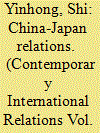

|
|
|
| 3 |
ID:
149642
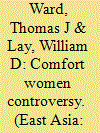

|
|
|
|
|
| Summary/Abstract |
During the World War II, up to 200,000 women, the majority of whom were Korean, were forced to provide sex to Japan’s military forces. The perceived refusal of Japan to fully take responsibility for the mistreatment of these “comfort women” has been a major obstacle to Japanese-Korean relations for a quarter of a century. Although the signing of the December 28, 2015 Agreement between Japan and Korea purported to “finally and irreversibly” solve the comfort women issue that has divided these two East Asian powers, the voices of Korean and Korean-American civil society indicate the contrary. American local, county, and state governments have become key battlegrounds in the conflict. As comfort women memorials across the USA proliferate, these governmental entities have allowed themselves to be caught up in incomplete narratives, whether Japanese or Korean. Against the backdrop of the tense geopolitics of today’s Asia-Pacific, a more responsible, comprehensive inquiry is needed to bring closure to a tragic chapter of human history.
|
|
|
|
|
|
|
|
|
|
|
|
|
|
|
|
| 4 |
ID:
171152
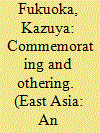

|
|
|
|
|
| Summary/Abstract |
The Yasukuni Shrine in Tokyo, once the symbolic center of national commemoration of war dead in pre-War years, is now regarded as one of the critical conservative symbols of Japan’s imperial past. While the Yasukuni study is expanding, not much has been explored on the nature of public reactions to the controversy. This study explores Prime Minister Abe Shinzo’s Yasukuni pilgrimage in 2013 and delves into Japanese public opinion on and around it. Overall, the Japanese public is relatively composed and prefers cautious approach; yet, at the same time, more people now support the official Yasukuni visits in general. This study also reveals discernible, yet nuanced, disagreements among PM Abe’s Yasukuni policies, the public perceptions of them, and the narratives of major newspaper editorials on this issue. The coverage of public opinion polls by the major national newspapers uncovers the public opinion on (1) the official Yasukuni visit, (2) the idea of building an alternative non-religious national memorial, and (3) the Japanese public’s decreasing sense of affinity toward China and South Korea (and their implications on understanding the Yasukuni issue and the sense of nation). The study will also examine the newspaper narratives on the controversy, which should help exemplify the overall public mood over the years.
|
|
|
|
|
|
|
|
|
|
|
|
|
|
|
|
| 5 |
ID:
130631
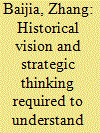

|
|
|
| 6 |
ID:
130627
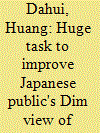

|
|
|
| 7 |
ID:
114065
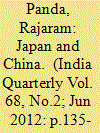

|
|
|
|
|
| Publication |
2012.
|
| Summary/Abstract |
Sino-Japanese relationship is too complex a narrative in the study of security and strategic dynamics of East Asia. Despite historical irritants both have developed such a close economic relationship that neither can afford to derail the partnership by any act of miscalculation. Though neither perceives the relationship in zero-sum-game terms, both realize the benefits that would accrue if it is deepened, nothwithstanding the element of fragility in the relationship. More recently, China's military modernisation and rising assertiveness in territorial issues have raised anxiety in Japan. Similarly, China does not see kindly to Japan's Defense Guidelines that mentions China as a matter of 'concern'. The contending claims over the Senkaku Islands are a sore point in the relationship and a solution does not seem to be in the horizon. This article attempts to analyse the intricacies in the bilateral relationship in the context of changing security dynamics in the Asia Pacific region and in the wake of economic interdependence and the desire to foster economic integration of economies. China is a big challenge for Japan. Managing China through regional institutions such as East Asia summit and ADMM Plus are the desirable options. The extended presence of the US as a stabilising force is likely to stay despite talks of US 'decline'.
|
|
|
|
|
|
|
|
|
|
|
|
|
|
|
|
| 8 |
ID:
154259
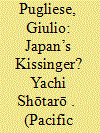

|
|
|
|
|
| Summary/Abstract |
This article reassesses the 2006 and, tentatively, the 2014 reset in Sino-Japanese relations to argue in favour of an increasingly state-centric understanding of Japanese diplomacy. By making use of a narrative account and a variety of primary sources—including personal memoirs, elite interviews, participatory observation, and leaked State Department cables—this article finds that Abe Shinzō’s foreign policy confidante, Yachi Shōtarō, embodied the unmatched influence of government actors in Japan’s political landscape. The article provides a close-up portrait of Yachi, with an emphasis on his preference for geopolitics, strategy, and secret diplomacy. Yachi and the institutional apparatus he represented sought détente with Japan’s main strategic adversary, while pushing for geopolitical initiatives that targeted China. The article concludes by arguing that the Abe administration’s insistence on, and institutionalized practice of, conducting public affairs in secret will likely further strengthen the role of the nation-state and of government actors in Japan, also in light of growing geopolitical tensions in East Asia.
|
|
|
|
|
|
|
|
|
|
|
|
|
|
|
|
| 9 |
ID:
144904
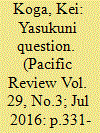

|
|
|
|
|
| Summary/Abstract |
This article argues that the problem of the Yasukuni Shrine between Japan and South Korea stems from the differential growth of Yasukuni discourses in both countries after the Pacific War. While the Japanese post-war discourse split into three schools of thought – Nationalists, Moderates, and Progressives – South Korean discourse has been consolidated into one dominant anti-Yasukuni perspective, largely shaped by Japan's political discourse and actions from the 1980s. This divergence created the perception gap between the two, resulting in a diplomatic obstacle that hinders Japan--South Korea strategic cooperation.
|
|
|
|
|
|
|
|
|
|
|
|
|
|
|
|
| 10 |
ID:
074832
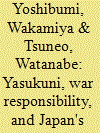

|
|
|
|
|
| Publication |
2006.
|
| Summary/Abstract |
The editorial chiefs of two major newspapers discuss Prime Minister Koizumi's visits to Yasukuni Shrine, noting that this shrine not only venerates class A war criminals but also operates a memorial museum that glorifies militarism. Both favor construction of a new memorial facility for the war dead and clarification of the responsibility among those who led Japan into war.
|
|
|
|
|
|
|
|
|
|
|
|
|
|
|
|
|
|
|
|
|